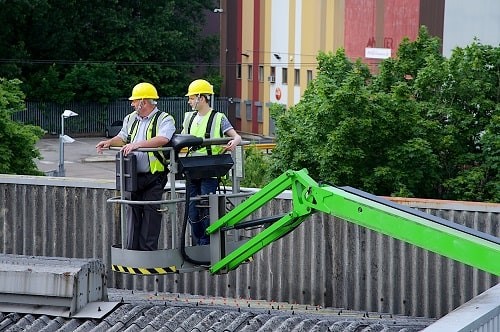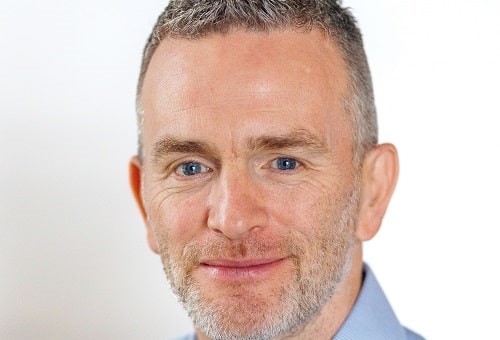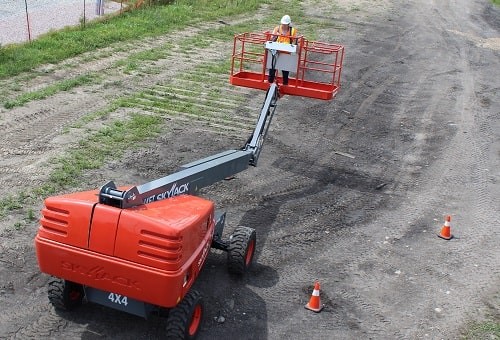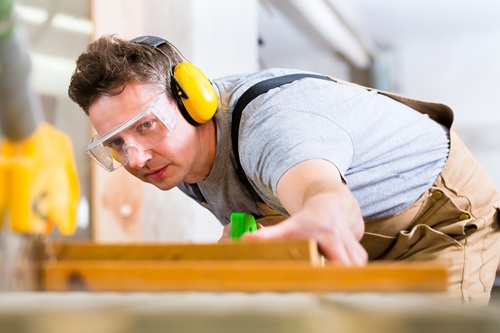Falls from the platform are the most common cause of serious injury and death when using mobile elevating work platforms – but they can easily be prevented.
Features
Don’t Fall For It! How IPAF’s safety campaign aims to save lives
Can an industry safety campaign really save lives? Should we be challenging the industry over persistent rates of serious injury and deaths caused by the same type of incident? Surely, we should never get complacent when we see reports of people making avoidable mistakes and suffering catastrophic consequences.
Every year, the International Powered Access Federation (IPAF) promotes a global safety campaign targeted at a specific type of risk or incident outcome, emphasising the importance of working safely to mitigate specific concerns and avoid certain types of incident when using mobile elevating work platforms (MEWPs), such as scissor lifts, articulated booms and truck-, track- and van-mounted booms.
 Falls from the platform remain stubbornly and consistently the number one cause of serious injury and death. Photograph: IPAF
Falls from the platform remain stubbornly and consistently the number one cause of serious injury and death. Photograph: IPAF
IPAF’s latest Don’t Fall For It! safety campaign outlines the possible underlying causes of falls from the platform when using MEWPs, which almost always lead to serious injury or death. It offers operators and managers key advice to mitigate the most common risks and avoid accidents of this type, as identified in IPAF’s ongoing incident reporting and analysis via the ipafaccidentreporting.org portal.
IPAF has now been collecting and analysing incident reports for more than a decade, having begun gathering anonymised accident reports in 2012. Across all of that period, falls from the platform have remained stubbornly and consistently the number one cause of serious injury and death; something IPAF resolved to try and shift the dial on.
As Peter Douglas, our CEO & MD, says: “MEWPs are designed to safely conduct temporary work at height in just about every environment, but every year the most common type of accident we are seeing reported are falls from the platform. As you can imagine, this type of incident nearly always leads to serious injury or death.
“We determined that our Don’t Fall For It! targeted global safety campaign should have a real impact when it comes to instilling safe working practices and reminding operators and managers of some fairly basic positive steps they can take to reduce the risk of such incidents occurring. The messaging is really simple – select the correct machine for the job, don’t take risks, don’t cut corners, and wear the correct personal fall protection equipment in boom-type platforms.”
 Brian Parker, Head of safety & technical at IPAF
Brian Parker, Head of safety & technical at IPAF
Operators can help avoid this type of accident by focusing on the principles we’ve set out as part of this campaign. If they are properly trained and familiarised on the MEWPs being used, then hopefully none of this guidance should be new, but we know that complacency breeds contempt, and that too often corners are being cut or fundamental principles of safe use ignored.
With this safety campaign, IPAF is saying that, if you find yourself tempted to do something different to what you know is the right and proper way to work, or if you are ever asked to do something that you think just isn’t safe by a work colleague or supervisor, then ‘don’t fall for it!’ Far better to think twice and save a life – whether it is a colleague’s or your own.
Key points of guidance in the IPAF Don’t Fall For It! global safety campaign include:
- Plan thoroughly – conduct a proper MEWP site survey/assessment, select the correct machine for the work and use professionally trained operator(s) and supervisor(s).
- Know your machine – operators must be trained on the machine type they are using and familiarised on the specific model. Operators should assess that the machine is suitable for the task and conditions, and adequate in terms of reach, articulation and load-bearing capacity. Machine knowledge includes whether personal fall protection equipment (PFPE) should be used and, if so, what type and how to attach it.
- Clip on – if personal PFPE is required, all occupants of the platform must attach their lanyard to the correct anchor point. Ensure movement within the platform is possible while attached, and do not move the machine or elevate the platform until and unless all occupants are attached.
- Set up and manoeuvre the machine/platform effectively – occupants should never need to over-reach, unfasten PFPE, step or climb on guardrails or otherwise extend the safe working envelope of the platform. Ensure vertical MEWPs are positioned and repositioned as necessary to allow easy access to the area of work to be undertaken; operators should not overreach or stand on guardrails to access a work area instead of taking the time and effort to correctly reposition the machine.
- Stay inside the platform/attached – the guardrails of the platform form the primary fall prevention and define the operational envelope of the machine being used. Always stay inside the platform. Where there is a requirement for PFPE, you must wear it. Do not exit the platform at height; unclip/exit only on completion of work when safely lowered to the ground.
In support of the Don’t Fall For It! campaign IPAF in the past year has issued tailored safety guidance, including detailed documents about the Safe Use of MEWPs in Public Areas, Safe Use of MEWPs to Manage Trees and Vegetation and the MEWP Catapult Effect.
IPAF has reviewed and updated training including its Loading and Unloading MEWPs Course and has also issued (or is in the process of issuing) new courses. These include Site Assessment (for MEWP selection); an updated Harness course, broken down into Harness Awareness, Harness User, and Harness Inspector modules; and a new IPAF Demonstrator course. IPAF is embarking on a major review and update of its MEWP operator course, while IPAF’s International Safety Committee is also reviewing the industry technical guidance issued around the use of Fall Protection in MEWPs.
 If you are ever asked to do something that you think just isn’t safe by a work colleague or supervisor, then ‘don’t fall for it!’ Far better to think twice and save a life. Photograph: IPAF
If you are ever asked to do something that you think just isn’t safe by a work colleague or supervisor, then ‘don’t fall for it!’ Far better to think twice and save a life. Photograph: IPAF
The IPAF ePAL App for MEWP and MCWP operators has now surpassed a quarter of a million first-time downloads worldwide since being launched in 2021. In addition to offering an easy way to store and share training certification (including a digital IPAF PAL Card) and log equipment time, the app provides a portal for easy on-the-spot incident reporting and gives operators timely safety tips and technical guidance updates.
And last year IPAF modified its Accident Reporting Portal to offer reporting members a useful new dashboard through which companies can benchmark their own safety performance against the wider industry – for instance against a specific end use or by country or region.
IPAF continues to encourage the reporting of all accidents and near-misses via its reporting portal and will continue to use the analysis of this data to produce free-to-download industry-wide documents, like the IPAF Global Safety Report. The data will also inform all the work the Federation does, including informing and updating our training programme and our safety and technical guidance. IPAF also continues to work with regulatory and legislative bodies to develop and implement standards and to aid companies with compliance.
Looking at the latest available accident statistics, there are encouraging signs that, despite an increase in reporting, that the number of serious injuries and deaths sustained across the MEWP industry worldwide may have fallen significantly year-on-year. While it is difficult to point to the impact that IPAF’s Don’t Fall For It! campaign may have had in achieving this, if our global targeted safety campaigns can save just one life, then it is worth all the time and effort that the IPAF team, and our members worldwide, continue to put in.
New Andy Access posters and toolbox talks now available
IPAF has published a host of new toolbox talks and ‘Andy Access’ safety posters in the past 12 months, including briefings on: Safe Mast Climbing Work Platform (MCWP) and construction hoist (CH) loading; MCWP and construction hoist rescue planning; assessing MEWP tyre condition; and how to prevent falls from height – part of IPAF’s Don’t Fall For It! global safety campaign.
IPAF’s popular Toolbox Talks are a series of short safety briefings designed to share specific safety messages on work sites and in breakrooms. They are complemented by accompanying Andy Access safety posters to remind operators and supervisors of the principles of safe operation.
IPAF published several new Toolbox Talks during 2022, and those in charge of safety involving MEWP, MCWP or construction hoist operations are invited to download the talks and Andy Access posters free of charge, The resources are available in multiple languages and can be used in briefings and in safe systems of work.
The full list of talks issued in 2022 is as follows: Safe On-Site Servicing of MEWPs, MCWP Loading, MCWP and Construction Hoist Rescue Plan, Construction Hoist Loading, MEWP Tyre Condition, and Falls From Height: Don’t Fall For It!
Mike Ashton, IPAF international safety and technical advisor, says: “IPAF puts a lot of resource into preparing these Toolbox Talks and we now have a Toolbox Talk Work Group drawn together from across our membership. We create them based on feedback from across the industry, as well as trends we identify through analysis of data gathered through the IPAF accident reporting portal and in our annual Global Safety Report.”
Find the resources at: ipaf.org/en/resource-library
IPAF is a not-for-profit members’ organisation that promotes the safe and effective use of powered access equipment worldwide. Members include manufacturers, rental companies, contractors and users.
For more information on all of IPAF’s safety campaigns, links to relevant safety and technical guidance and the full range of IPAF training courses, see: ipaf.org/safe
ipaf.org/training
New toolbox talks and ‘Andy Access’ safety posters also available at ipaf.org/en/resource-library
Brian Parker is Head of safety & technical at IPAF (International Powered Access Federation).
FEATURES

Turning sustainability compliance into business opportunity
By Alastair Loasby, Saffery LLP on 27 February 2026
Businesses that publicly demonstrate good sustainability performance can reap financial, reputational and other benefits, but it’s important to minimise the cost of any reporting on sustainability issues and to focus efforts on improving aspects of sustainability where the benefits outweigh the costs.

How to mitigate the hearing loss cost escalation tsunami
By Peter Wilson, Industrial Noise and Vibration Centre (INVC) on 06 February 2026
Employers need to adopt the latest and most effective noise risk evaluation and management measures, or face rapidly-rising compensation claims for noise-induced hearing loss at work.

Young drivers and work-related road risk: why employers must act now
By Simon Turner, Driving for Better Business on 06 February 2026
Young drivers have a higher risk of being involved in road collisions due to factors such as their inexperience, so when employing them to drive for work, it is vital they receive the right support to help them grow into safe professionals behind the wheel.



